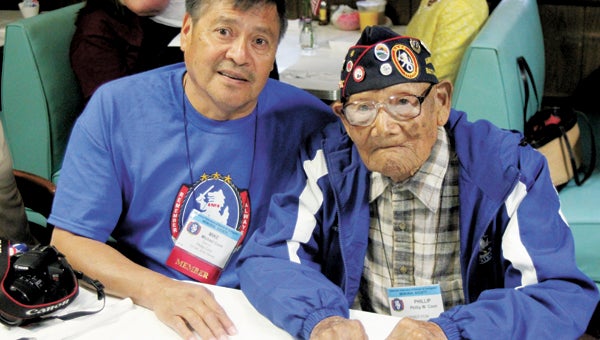POWs gather in Suffolk
Published 10:20 pm Friday, May 24, 2013

Veteran Mike Coon sits with his father Phillip W. Coon, 94, who was among a dozen World War II prison camp survivors who gathered at Bunny’s Restaurant Friday. The men were guests of a Suffolk group that meets regularly at Bunny’s to honor former prisoners of war.
Before Japanese soldiers captured Earl Szwabo in 1942, he had manned a 12-inch disappearing gun in a sea battery on the Philippines island of Corregidor.
“We picked off the Japanese until our ammunition went down, then they had air power and we had to surrender,” said the 91-year-old, who was among a dozen former World War II prisoners of war honored during a lunch at Suffolk’s Bunny’s Restaurant Friday.
Following his capture, Szwabo was sent on the Bataan Death March, in which hundreds of American prisoners and thousands of Filipinos were killed.
He escaped, was recaptured, and then was placed on what was dubbed a “Hell Ship,” which sailed for Japan.
He survived to make it to the Nagoya prison camp, where he would spend the next four years.
“The Japs fed us rice balls with a cherry in the middle,” Szwabo said. “We were lucky if we got one a day.”
The prison camp survivors who traveled to Suffolk on Friday have been in Hampton Roads this past week for a Descendants Group of the American Defenders of Bataan and Corregidor annual conference.
Members come from across the nation, and the conference rotates among eastern, western and central USA year to year, said Caroline Burkhart, group vice president.
Press clippings had taught members all about the breakfast meetings at Bunny’s, where a dwindling group of other prison camp survivors, only one of whom remains alive today, has gathered each month for years to share stories.
“We made time to come here,” Burkhart said. “I called the restaurant and said, ‘We’re coming over for lunch.’”
The restaurant connected Burkhart with William Blair, the North Suffolk businessman who sponsors the regular Bunny’s breakfasts.
“I called him and he said, ‘I’m paying for it,’” Burkhart said.
Szwabo, who attended the lunch with his Navy grandson, Portsmouth-based Petty Officer 2nd Class Jozef Szwabo, had traveled from Missouri. So did 90-year-old Ralph Griffith.
Griffith and 89-year-old James Collier, of Salinas, Calif., served in sister regiments, and both were interred in the Philippines.
From the Philippines, Griffith was shipped out to China as slave labor in a machinery factory, while Collier was forced to push tramcars piled with ore in a steel mill in Japan.
“There were not any words for it, believe me,” Collier said of his release when the war was over. “It was just like going from hell to heaven overnight.”
Blair said the Bunny’s lunch was “very rare. The only reason this group is here is for the convention in Norfolk.”
Many at the lunch were regulars of the breakfast gatherings, such as Vietnam veteran Ed Fancher. A new face was Capt. George J. Vassilakis, the new commander of the USS Bataan.
“We try to make sure our sailors understand the linkage and heritage and the history of a time that was very dark, but turned out to be historically significant,” Vassilakis said.





